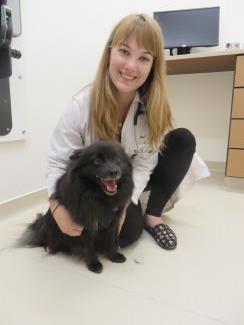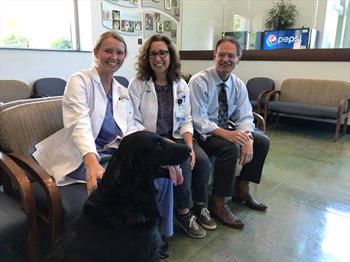Zita cancer vaccine trial

Dr. Kara Magee cuddles up to Zita during the Pomeranian mix's first appointment at the University of Wisconsin trial. Photo by Phyllis DeGioia/VIN
Zooka is an old hand at participating in clinical trials. The flat-coated retriever is currently in one testing for a canine cancer vaccine that could someday also help prevent cancer in people. The hope is to prevent cancer rather than treat it. In Zook's first clinical trial, he scored a gastropexy to prevent gastric dilatation-volvulus (GDV), commonly known as bloat. This time he got a couple of shots and now shows up every 6 months for a checkup and blood draw.
The cancer vaccine trial is my dog's first time doing our bit for science and vet med. Zita relishes her role as contributor because everyone at the vet school tells her how cute and wonderful she is.
Both dogs are enrolled in the same trial at different veterinary schools. Zooka lives near the University of California, Davis, and Zita, a Pomeranian mix, is a few minutes from the University of Wisconsin in Madison. Colorado State University in Fort Collins is the third site. This clinical trial is the largest one ever conducted for canine cancer until now.
"I was anxious to get into this trial," said Gina Spadafori, Zooka's owner, formerly the writer and editor of the nationally syndicated Pet Connection column. "Zooka is 8. Many flat-coats die of cancer at 7 or 8, but there's a feeling that if you can get them to 9 cancer-free they will likely make it to 11 or even older. I try not to think about cancer, but it's hard to avoid in this breed. Especially when you have one in that risky age group."
Zooka cancer clinical trial

The head of the study, Dr. Stephen Johnston (right) of Arizona State University, was visiting. Zooka met him, veterinary student Emily (left) and Dr. Jenna Burton (middle), veterinary oncologist and associate professor at the UC Davis School of Veterinary Medicine. Dr. Burton is now at Colorado State. Photo by Gina Spadafori.
Flat-coated retrievers are known as a cancer breed; Pomeranians are not.
Gina, 63, has likely owned more dogs than most people, and has lost a few to cancer. Her first dog, a Sheltie, died of cancer. All of her flat-coats died of cancer, but except for two, they were 12 years old. As Gina points out, when you get old, you'll eventually die of something. However, two died at the tender age of 7, one of malignant histiocytosis (a/k/a “flat-coat cancer”) and one of hemangiosarcoma in the spleen. Both of those types of cancers are common in flat-coats, along with osteosarcoma.
I've only had one dog with cancer, a bichon Westie mix who was diagnosed with anal sac cancer at 11, and eventually died of old age at 15.5. But the road to survivorship was difficult as he had the kind of side effects - a bad reaction to not one but two chemo meds - that the attending veterinarian said "an oncologist only sees once in a career."
Zita is now 10, but at 18 pounds and healthy she could easily live to 15. We went to the vet school last week for her 18-month checkup. They took blood and a fine needle aspirate of a tiny lump below her throat. My heart clutched in icy dread when I found it, but thankfully it was just a lipoma.
As I stayed curbside, Zita ran off with Ruby, the technician she sees every time, and stared up at him adoringly. I love our Ruby too! Zita doesn't like going to her own vet and sometimes cowers at the door, but she loves the vet school. Everyone talks to her and laughs at her party girl antics, and you don't usually see a lot of antics in the oncology lobby. It's sobering to see owners there with their pets in treatment, hoping that someday their pet will be the one making everyone laugh at their rechecks. Zooka has always had a great time there in his 2 years: Gina says he is social, everyone fusses over him, and he thinks it's just a great outing. With curbside dropoff, Zooka goes dancing off without a look back.
Gina was anxious to get Zooka into this trial. Having written so much about pets and their health (including the original Dogs, Cats and Birds for Dummies) she believes it would be possible to outcross the flat-coats to lessen the possibility of cancer in the breed.
"It's one of those things that's not technically difficult to fix as far as the science goes," she said, "but the politics are not conducive to bringing non-flat-coats into the gene pool, and I'm not sure that will ever change. It's why my current flat-coats are likely my last. Doing this trial seems fitting, a final, hopeful gift to people who love and lose their dogs to cancer.”
Every participant at all three sites has their reasons for joining this clinical trial.
Most of Gina's significant experience with cancer comes from her dogs. In her family, only her grandmother had cancer and even then she was well into her 80s. My experience is the opposite: I had one affected dog, and a family history of cancer that gives pause to oncologists. It certainly gave pause to my breast cancer surgeon. My cancer was caught early when it was the size of half of a BB. I'm still surprised they found it in the first place.
I'm not up for treating any more of it: not in my pets, not in myself. I'm sure Gina feels the same. I can, and I likely will, but I don't want to have to. If this trial helps us get to the point where we don't have to treat it anymore, then I'm all over it. I'll do anything to prevent subsequent generations of dogs and people from this scourge.
One stumbling block Gina had to come to terms with before she decided to enter was that Zook's eventual necropsy, whenever that happens, is supposed to be done at the vet school. He is 85 pounds, so she figures she will have to have him euthanized him there because she can't transport a body that heavy on her own.
"What necropsy?" I asked.
"Read your contract," she said.
(I dialed my beloved Ruby, then went back to Gina.)
"Yep, I'm supposed to bring her in for that. My memory is a sieve."
Neither dog had trouble after receiving the two shots that make up the full vaccine. In this controlled double blind study, the doctors don't know who is getting the vaccine and who is getting the placebo, and they never will so they won't be able to tell us. Zooka had a little bit of muscle soreness and was somewhat lethargic after his shots, so Gina is hoping he got the vaccine. Zita had no reaction.
Each participating dog will go for a follow up every 6 months for 5 years after the shots were given. That's presuming neither of them dies in that timeframe. At the moment, Gina has four dogs and currently does not plan to have more any time soon. In addition to another flat-coat, she has a pair of Shelties, including one “foster fail” she ended up with after the little dog's owner died.
"I don't have a dog shortage," Gina said. "The Shelties will probably outlive me."
I have one other dog, a 13-year-old collie. I expect to lose her well before Zita. I'll think carefully before getting more dogs as I want to travel in retirement.
Whatever happens health wise to Zooka and Zita will likely not surprise either of us. When you share your life with dogs, you deal with whatever is thrown at them, expected or otherwise.
That doesn't mean you have to continue doing everything the same.
"I think I'm done with flat-coats," said Gina. “They are such wonderful companions, and that makes losing one young ever harder to bear."
For more information
The trial is still accepting applicants.
Colorado State University
University of California, Davis
University of Wisconsin
Interested in participating in a clinical trial? See which ones are accepting patients.
Editor's Note: Zooka died of hemangiosarcoma two months after this article was published. He was fine three hours before he was euthanized.